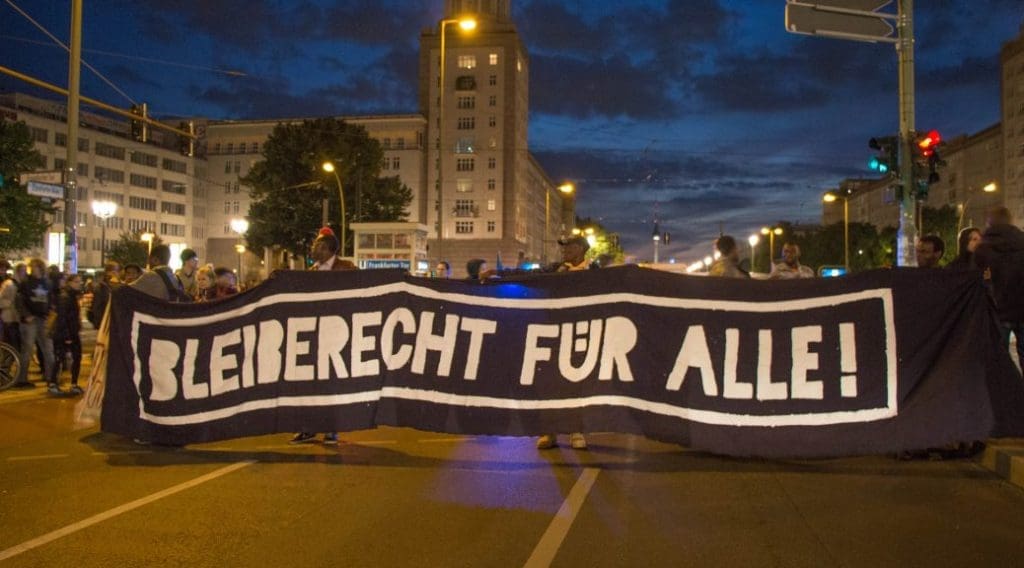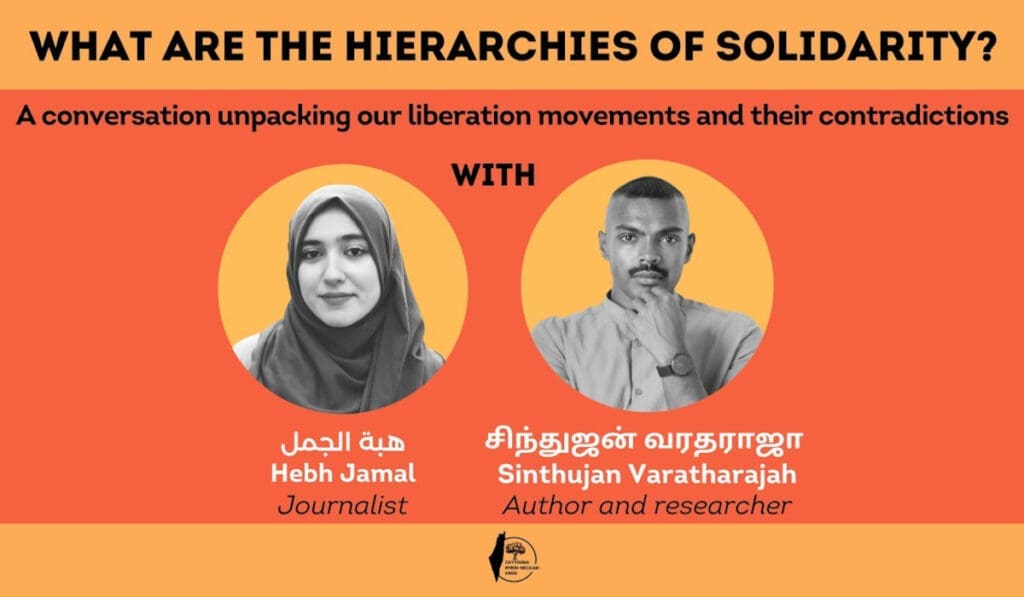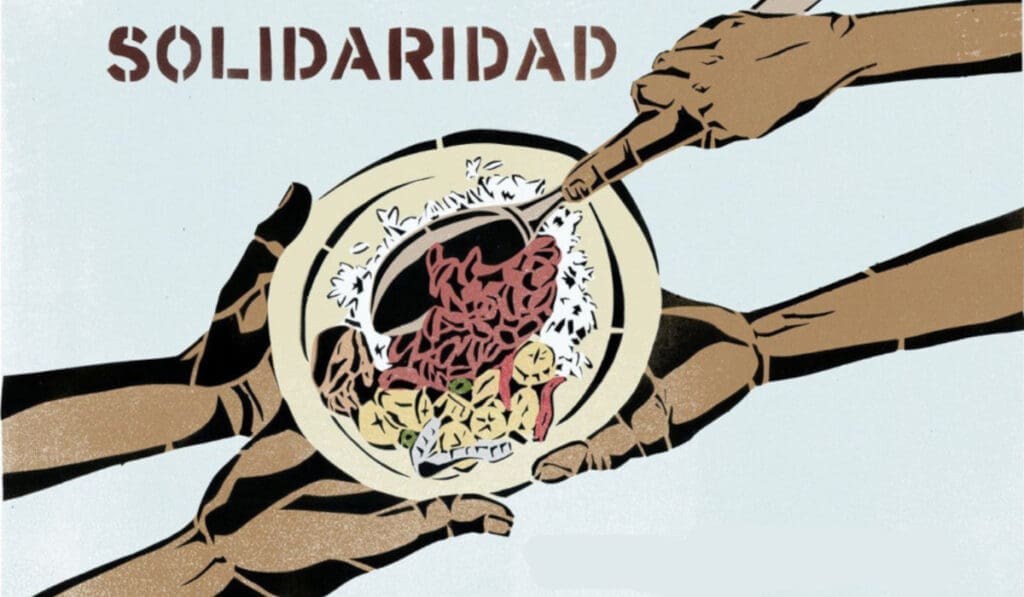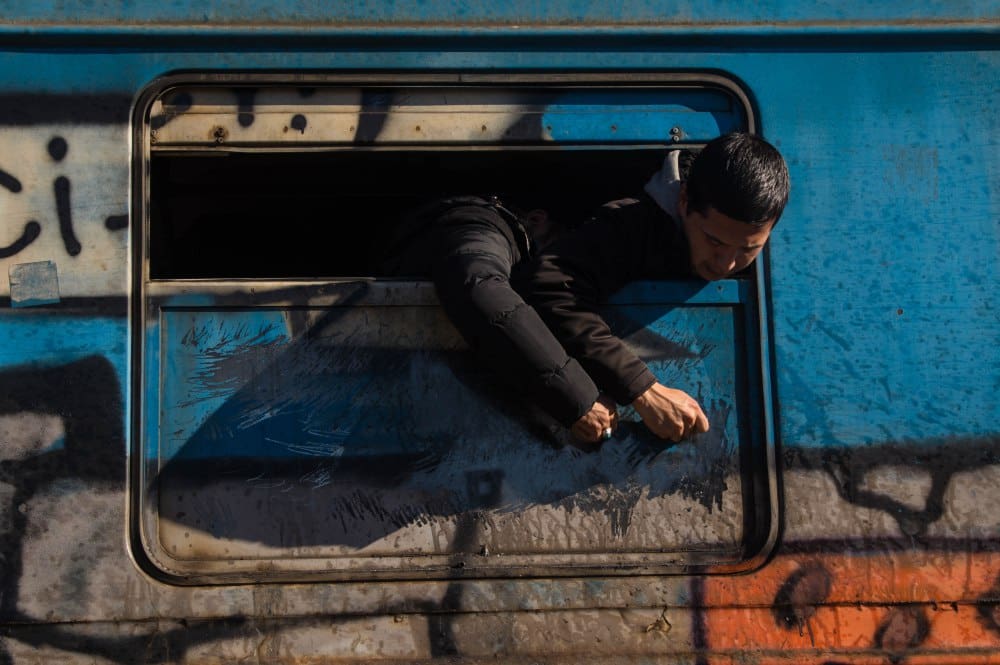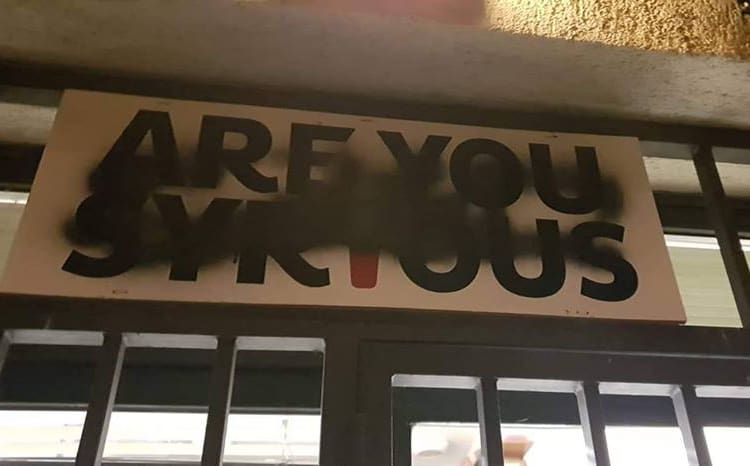AntiNote: We have been reporting enthusiastically on migrant-led justice movements in Germany, Switzerland, and elsewhere for several years; some of the locations and initiatives mentioned in this article have already been featured in these pages, generally in a positive light. We therefore wish to preempt accusations of naivete by presenting here an account by an anonymous group of Berlin activists who, after a couple years of organizing, are taking a dimmer view of the prospect of collective, collaborative, mutually-propulsive struggles shared by migrants and local movements.
Where our readers, like us, might find some of the observations in this text objectionable, we invite counternarratives and rebuttals—as long as they are based in actual practical experience. We’re always happy to hear from you at antidote[at]riseup[dot]net. Let’s all keep trying, and keep learning from one another. We’re going to have to get good at this stuff.
For refugee perspectives on some of the same problems described here, please see this and other articles under our tag No One Is Illegal.
After the Storm at the Border
Reflections on Self-Organization Among Refugees and Solidarity Activists in Berlin
by some radical leftists in Neukölln for Lower Class Magazine
20 May 2017 (original post in German)
Just before the officially-declared end of the “short summer of migration,” in the fall of 2015, we began organizing with refugees in the Berlin district of Neukölln. Together, we set about using the “storm on the borders” of Fortress Europe as grounds to agitate against the isolation and eroding of solidarity brought about by the camp system as well as the tightening of asylum laws in Germany. After a year and a half, we would like to offer an assessment of the work thus far and put our experiences and observations up for discussion.
With the onset of the so-called refugee crisis, parts of the radical left, adhering to the concept of the “autonomy of migration,” hoped that new migrants would bring new energy to the local anti-racist movement and that new struggles would emerge from an altered class composition. Impressed by the collective direct action of migrants’ bold border crossings, more than a few expected that their backgrounds and experiences (Arab Spring, self-organized migrants’ movements) could open up a new horizon for social struggles in Europe. Beyond this somewhat uncritical euphoria, we hoped from the start that we could at least develop an interchange with migrants to share experiences and, in the best case, begin to build our struggles together.
Therefore, in the fall of 2015, we started visiting various refugee camps in Berlin-Neukölln in order to get a look at the situation for ourselves. Instead of propping up the private operators of the camps with charity efforts and therefore compensating for the high-handed indolence of state authorities, we wanted to nurture direct relationships with refugees. We had questions: who are the newly arrived migrants in Berlin? What desires and experiences have they brought with them? How do they deal with the bullying of authorities like LaGeSo [Landesamt für Gesundheit und Soziales or state office of health and social affairs], the bureau of migration, and camp administrations?
In the framework of a citywide networking summit by the No!Lager organization, we met others who shared our critique of state structures and wanted to try to establish contact among refugees in other neighborhoods outside of the classic parternalistic aid structure. Groups were formed in Friedrichshain, Neukölln, Tempelhof, and in Wedding, among other districts.
“Refugees Welcome” – between opposition and cooptation by that state
The chaotic events of summer and fall 2015 revealed a possible faultline in state power, or at least a short period during which the state was overwhelmed. At the same time there appeared a massive readiness, across a wide social spectrum, to rush into the breach and engage with refugees—for example through collecting donations, shared social activities, language lessons, or political actions. As a result, over a short time parallel structures emerged that partly undermined migration control and made the inaction of the state visible. This intensified political conflicts at both the federal and state levels—just before state parliamentary elections—over what to do about the new migrants’ movements, and it disrupted business-as-usual in politics countrywide.
Even if we critically questioned many aspects of the so-called Willkommenskultur [culture of welcome] that was forming then, we regard it as vitally important that wide swathes of the population stood in concrete solidarity with refugees, called state structures into question, and in some cases effectively superseded them.
Since then, though, parts of the Willkommenskultur have aligned themselves with the state; many are now wage workers in what could be termed Refugees, Inc., as social workers, teachers, or security personnel. This integration into the state apparatus prompted criticism, rightly, from the radical left; nonetheless it is not a sufficient explanation for the nonappearance of a more widespread self-organization. Practical aid and solidarity generally remained limited to immediate or emergency relief efforts and were unable to bring a new dynamic into anti-racist struggles and class conflict.
Individualization Instead of a Broadening Front
After their arrival in Germany, an increasing individualization occurred among refugees. In some cases lodged in gigantic camps isolated from the rest of the population, they had to wrangle with unfamiliar bureaucratic processes alone. In their asylum proceedings, they had to put up with and provide answers to interviewers who had mostly been crash-trained only in the administrative matters involved in their new line of work. Instead of collectively overrunning Hungarian border checks or Austrian freeways, now the refugees were standing across from state authorities one by one and had to act in competition with others for placement in residences and schools.
Our hopes have been dashed, to be honest. We can hardly speak of finding common ground for common struggles in the current situation. The first new legislative package tightening asylum regulations (Asylpaket I), rammed through parliament in October 2015, was only a taste of what would come to be faced by those arriving in the future. Divisions by ethnicity and nationality would only deepen. While many people of Afghan, Syrian, and Iraqi origin had to stand and wait in shitty conditions outside the LaGeSo offices in Berlin in order to get an appointment to register—along with the chance at an apartment, a residence permit, and with that potentially the start of a better life in Germany—people from Balkan countries and elsewhere changed their strategies: medical excuses, rescheduling appointments, and failure to appear altogether became generalized practices used to avoid looming deportations.
By winter 2015-2016 at the latest, further divisive tendencies emerged. Syrians were given preferential treatment by authorities like BAMF [Bundesamt für Migration und Flüchtlinge or federal office for migration and refugees] and LaGeSo, and received residence permits (even if only temporary ones), and therefore access to apartments and language courses, more quickly. As opposed to many others, their chances of being able to stay, at least for the next few years, are relatively secure.
First Impressions of the Camps
It was clear early on that, given the large number of new migrants, shelter and lodging would become a central issue—for the state, since it suddenly had to provide mass shelters and affordable apartments in a city already plagued by a housing shortage; for the refugees, because they were facing years of life in camps.
Starting in October 2015, we visited many of these camps, distributed fliers with information on counseling services in Berlin, and tried to come into conversation with refugees. Because of the language barrier this was at first only possible with refugees who spoke English. With a few tricks it was possible to enter the camps: we took advantage of the structural disarray and claimed, for example, that we were official aid workers signed up for scheduled shifts. Even if it wasn’t clear to many refugees at first whether we were there to provide aid or information or some other bureaucratic function, some of them got our message: “You shouldn’t expect help from the state. If you want to change something about your situation, you will have to organize yourselves. We should get to know each other and talk about where you’re at and what you can do.” Many, sometimes after only a few weeks, had already had enough of the camps, of doing nothing, of waiting, waiting, waiting.
Unfortunately we only had a short window of opportunity to get a glimpse of the largest camp in Berlin, a former hangar at Tempelhof airport, and thus be able to imagine what it means, practically speaking, for a private company to take over the organization of a camp. The corporate operating firm Tamaja was well aware of the explosive potential of this competitive market—its executive, Michael Elias, soon saw to it that his company’s structures were not infiltrated by political groups. All visits were prohibited, security guards were ordered to intervene forcefully with any unauthorized intruders, and camp workers who addressed refugees’ concerns with too much sympathy were swiftly relieved of their duties.
Self-Organization at the Corner Store
In cooperation with the Weisekiez Initiative we were able to rapidly sling together a lively Refugee Cafe at a neighborhood shop, Lunte. A space began to take shape where we could get to know each other outside of the oppressive atmosphere of the camps. Despite the aforementioned barriers, forty or fifty people from various camps came by in the first few weeks. Here and there, we tried to begin to solve individual problems together. For us, however, it was important from the start that we go beyond the basic organization of the Refugee Cafe and enter into political exchange and inquiry, have conversations about their and our situations, and identify where we have common interests and how we could cooperate toward common ends.
People who came to the cafe included many Afghans who, lacking other employment opportunities at home, had supported foreign military units in the fight against the Taliban; Syrians who had taken to the streets against Assad; Iranians who had not been able to bear the rigid social order in their home country; and Pakistanis who had had enough of permanent joblessness and harassment by Taliban gangs. While many Syrians openly rejected German immigration policy and criticized Angela Merkel, many of the Afghan refugees tended to have a more positive regard for the proclamations of the German government.

After a few months of camp lodging and tormenting treatment, refugees at the hangar in Tempelhof organized a first demonstration, together with refugees in other districts and with our support, in order to protest camp conditions. With a few hundred participants, it was the first significant self-organized protest by refugees in the winter of 2015-16. But seeing that it hardly changed anything about their situation in camp, some of the Afghan refugees turned to us for advice. In view of their desolate living situation, they were planning to go on hunger strike. So with the help of a Turkish comrade—who himself had experience with hunger strikes and had also already taken part in protests at Oranienplatz in Kreuzberg—we organized a large roundtable discussion at Lunte. After a lengthy conversation, ultimately the participants came to the conclusion that a hunger strike would have undesired consequences (for example, families would be separated by the authorities if minors were taking part) and that it should be reserved as a last resort of political protest.
It didn’t escape anyone’s notice that many of the Syrians who had been coming to Lunte in the beginning were no longer showing up after a few weeks. Presumably their preferential treatment by the state in issuing temporary residence permits played a large role in this. It made more sense for them, understandably, to enroll in German classes, look for apartments, and work on starting their new lives rather than organize with German radical leftists against the state. In light of their markedly more precarious living situations, it’s hardly surprising that of the group that remained, it was mostly Afghans who came on a regular basis and still come today. The new agreement between the EU and the Afghan government will likely widen this separation between nationalities.
Out of the Refugee Cafe, Onto the Street
So together with refugees, primarily in the context of the cafe, we prepared several demonstrations against the living conditions in the camps and for affordable housing.
In the course of the Berlin election campaigns, it emerged that all the gymnasiums where refugees were lodged were supposed to be cleared out, in order to be put back to their regular use for the coming school year. Protests erupted against this plan in several places—not because the refugees felt they had found a good home in the gyms, but because the notion of moving into the mass camp at Tempelhof was such a horrifying prospect. They wanted to stay in their neighborhoods, where they had found new friends and where their children had begun to go to daycare or school.
In July 2016, a group of refugees who had been lodged in the Jahn gymnasium in Columbiadamm, Neukölln, refused to move to the Tempelhof hangar. In this struggle merely to maintain the status quo, both the weaknesses of the movement and prevailing societal power relations were on full display. The nearly three-week-long protest garnered a lot of attention, and for a short time, a new kind of alliance emerged among the protesters at the Jahn gym, refugees and radicals from the Refugee Cafe, former occupiers of Oranienplatz, and various other free radicals. Of the 130-some residents of the Jahn gym, it was almost exclusively young men from Syria who took part in the protest, while around a hundred mainly Afghan and Pakistani refugees, fearing repression, moved to the camp at Tempelhof without resistance.
The protest was successful insofar as the protesters were offered a temporary solution after several weeks: to move to a different gym. But with this “victory” there also came a bitter defeat. Although a large discussion- and organizational meeting represented an attempt to expand the protest to other camps, coordinated protests between the refugees in the hangar and those who refused to move there never got off the ground. The Syrian refugees negotiated the deal with the supervisor from Tamaja, the private operator of the camps at both the Jahn gym and the Tempelhof hangar, and wanted more than anything—understandably—some time to rest after the exertion of the protests. Others expressed a legitimate concern: “We don’t want a conflict with the German state—not if we don’t have to; and we only have to if they make us move to Tempelhof.”

That the protests were broken off in this manner struck us as a bitter defeat because the Syrians at the Jahn gym accepted this deal and declared the resistance over right at the moment that a mostly Afghan contingent from Tempelhof wanted to initiate a broader common struggle against the camp system as such. We did not criticize this decision, but noted that—as so often happens—an expansion and radicalization of struggle failed to materialize because of a desire not to risk losing what little had been gained. How long refugees in the hangar, physically and emotionally exhausted from months of camp life, could have held out in such a major struggle is nonetheless questionable.
Another Failed Attempt: A Meeting Place for Refugee Women
We noticed fairly quickly that although the Refugee Cafe was fairly well attended each week, besides a few early exceptions it was almost only men who came in. It was obvious that this rigid gender separation, which we were able to disrupt when it was between us and the male refugees, had to be tackled another way. So the women in our group decided to organize a meeting spot exclusively for women at the Neukölln “girls’ club” Schilleria.
Because of our contact to the camps, the Women’s Cafe was a success, initially: many women came, bringing their children along. But things began to degrade moving forward. We weren’t well prepared for children who had spent months or years in mass shelters and had grown up under traumatizing conditions, or for mothers whose primary interest, understandably, was to finally have a place where they could properly cook. It was difficult to get to know the women better, and not just because of the language barrier. In contrast to the men we met, women refugees seemed to have much less familiarity with foreign languages and were less frequently enrolled in German classes; but there were also significantly fewer common interests and points of connection—which isn’t particularly surprising, since we were mainly working with women from Afghanistan, a strongly patriarchal country, who had been prevented their whole lives from moving about independently in public or learning new things. Our ideas—for example, to invite members of Women in Exile to come and exchange ideas and perspectives about their situation and self-organized struggles with other migrant women—didn’t meet with much enthusiasm. The visitors of the cafe primarily wanted to cook, knit, and learn German. We had had other expectations; because of this we ended up shutting the project down after only six months.
Between Helping Individuals and Organizing Politically
In view of the objective situation refugees in Germany are stuck in (no apartment, no job, unclear prospects for staying, lack of medical care), it is not particularly surprising that we often found ourselves in the role of helping with people’s everyday problems. The health system, the social service administration, the housing market, and of course the migration authorities are organized in such a way that most refugees can’t really navigate them alone. This raises the question of whether there are moments within so-called social work which could facilitate political self-empowerment. The goal of our efforts must be to help people help themselves and to build networks together with refugees that would on the one hand serve the practical purpose of spreading information, contacts, tips and tricks for dealing with the authorities; and on the other hand offer space for political articulation and mobilization. As a result of various factors, we failed in this task.
All refugees are stuck in such a precarious situation that there is very little room to act and very little chance of successful political struggle of any kind.
We never expected any concessions from the state; to the contrary, we assumed since the beginning of the so-called refugee crisis that the government would keep tightening restrictions on asylum and immigration. Straining between attempts at political self-organization and providing direct aid to individuals, we started running out of steam. Further, there were relatively few refugees who were interested in ongoing political collaboration. Many of them remained simply “visitors” at the cafe, and only kept coming as long as they still needed individual help. This is an experience which is not new to leftwing circles—as, for example, the Alliance Against Evictions [Bündnis gegen Zwangsräumungen] has also demonstrated—and which we should critically examine.
Outlook
We have failed in our initial attempts at political intervention. The social and political situation of new migrants has continued to deteriorate since summer 2015, and has also gotten progressively more insulated from public scrutiny. Laws were changed in the blink of an eye, and new facts on the ground were repeatedly created for hundreds of thousands of refugees. To name a few examples: since Asylpaket I came into force, deportations must no longer be announced in advance; parts of Afghanistan have been declared “safe zones”; with newly restricted integration laws a backdoor was left open through which even migrants officially recognized as refugees can be required to stay in camps; and permits for apprenticeships are only issued if no “concrete measures for termination of residence” are in store. A broad movement against the new asylum laws or the acceleration of deportations to Eastern Europe and Afghanistan has remained absent.
It would be wrong to abandon central demands like a general halt to deportations and the abolition of the camp system just because of a difficult political climate. We failed in our initial objectives; nonetheless we were able to nurture many relationships to refugees, out of which perhaps more could emerge in case there are further debates over new legal restrictions, working conditions, or housing. Struggles by and for refugees have up to this point never fully materialized. Whether and how they could become a part of broader conflicts is uncertain. Isn’t it conceivable that community activists and refugees could jointly support airport workers and simultaneously demonstrate against deportations at Tegel airport, meanwhile blockading city highways together with numerous other supporters? What would happen if the next neighborhood march for affordable housing started at Tempelhof and included migrants in the mobilization?
Translated by Antidote
All images via Lower Class Magazine

